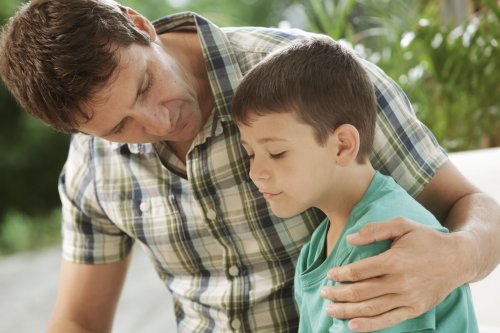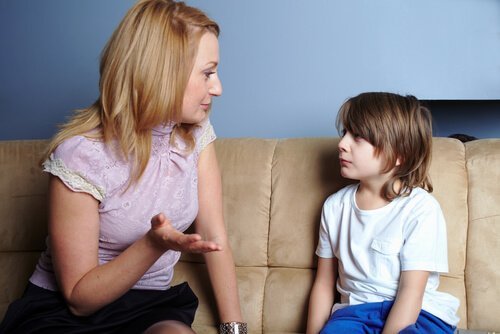Moral Development in Children: What Parents Need to Know


Written and verified by the psychologist María Alejandra Castro Arbeláez
This is an essential quality when it comes to functioning in society.
Moral development in children: What occurs?
Important psychologists like Jean Piaget and Sigmund Freud believed that babies are born without any sort of moral conscience. However, over the following months, mostly thanks to socialization, children develop a sense of morale. This allows them to distinguish between good and bad.
These world-renowned authors came up with differing theories regarding moral development in children. However, they did agree on one fact: Moral development is a process that occurs thanks to socialization and the learning of norms that govern society. Morale appears in each individual through different phases of life.
Without a doubt, the development of morality is greatly dependent on the norms that children receive from their family. Aspects such as respect, tolerance and adequate conduct make up a fundamental part of healthy moral development. And that is important both for children and for their environment.
Keys for moral development in children
As we’ve seen, moral development in children is part of a process that starts at 6 months old. For this development to occur, parents and other close family members and friends need to get involved with their children’s education and learning process.
They must teach fundamental values that will make it easier for children to join in society.

There are several keys that parents and teachers need to practice in order to optimize moral development in children:
- Adults need to teach the rules and norms of behavior, both in the home and in other environments as well.
- In order for children to absorb what adults are teaching, adults need to explain the reason behind the rules. At the same time, children need to know the consequences of disobedience.
- The best way to solidify learning is to teach by example. It’s not enough for parents to just talk with their children and explain right and wrong. They need to set an example. This is the most powerful teaching method of all.
- It’s not easy for children to understand concepts like compassion, respect, tolerance, etc. Parents need to keep this in mind. Teaching these values through practice and your own example is fundamental.
We recommend you make an effort to offer praise and positively reinforce your children’s good behavior. However, children also need to understand that their actions have consequences. Consequences are the best way to develop a child’s healthy moral character.

School and surroundings in the moral development of children
It’s true that parents and close family members are a fundamental part of moral development in children. But it’s also true that school, friends and classmates also play a key role.
As children grow, their parents aren’t always their reference point. Often, the values that parents have instilled in their children become distorted or twisted because of their social context. That’s why it’s important that parents remain involved and attentive.
Remember the importance of supervising what children see on the media. It’s best for children to only watch content that’s appropriate for their age.
Children may come to imitate their idols – singers, actors, athletes, etc. However, specialists claim this message isn’t powerful enough to change the values they’ve learned.
“The development of morality is greatly dependent on the norms that children receive from their family”
In conclusion, moral development in children is a process. It begins through socialization and the norms that parents teach in the home.
For all of the above-mentioned reasons, parental involvement is fundamental in all aspects of a child’s life. Morale is essential to a child’s healthy development as an individual, both on a personal and communal level.
This is an essential quality when it comes to functioning in society.
Moral development in children: What occurs?
Important psychologists like Jean Piaget and Sigmund Freud believed that babies are born without any sort of moral conscience. However, over the following months, mostly thanks to socialization, children develop a sense of morale. This allows them to distinguish between good and bad.
These world-renowned authors came up with differing theories regarding moral development in children. However, they did agree on one fact: Moral development is a process that occurs thanks to socialization and the learning of norms that govern society. Morale appears in each individual through different phases of life.
Without a doubt, the development of morality is greatly dependent on the norms that children receive from their family. Aspects such as respect, tolerance and adequate conduct make up a fundamental part of healthy moral development. And that is important both for children and for their environment.
Keys for moral development in children
As we’ve seen, moral development in children is part of a process that starts at 6 months old. For this development to occur, parents and other close family members and friends need to get involved with their children’s education and learning process.
They must teach fundamental values that will make it easier for children to join in society.

There are several keys that parents and teachers need to practice in order to optimize moral development in children:
- Adults need to teach the rules and norms of behavior, both in the home and in other environments as well.
- In order for children to absorb what adults are teaching, adults need to explain the reason behind the rules. At the same time, children need to know the consequences of disobedience.
- The best way to solidify learning is to teach by example. It’s not enough for parents to just talk with their children and explain right and wrong. They need to set an example. This is the most powerful teaching method of all.
- It’s not easy for children to understand concepts like compassion, respect, tolerance, etc. Parents need to keep this in mind. Teaching these values through practice and your own example is fundamental.
We recommend you make an effort to offer praise and positively reinforce your children’s good behavior. However, children also need to understand that their actions have consequences. Consequences are the best way to develop a child’s healthy moral character.

School and surroundings in the moral development of children
It’s true that parents and close family members are a fundamental part of moral development in children. But it’s also true that school, friends and classmates also play a key role.
As children grow, their parents aren’t always their reference point. Often, the values that parents have instilled in their children become distorted or twisted because of their social context. That’s why it’s important that parents remain involved and attentive.
Remember the importance of supervising what children see on the media. It’s best for children to only watch content that’s appropriate for their age.
Children may come to imitate their idols – singers, actors, athletes, etc. However, specialists claim this message isn’t powerful enough to change the values they’ve learned.
“The development of morality is greatly dependent on the norms that children receive from their family”
In conclusion, moral development in children is a process. It begins through socialization and the norms that parents teach in the home.
For all of the above-mentioned reasons, parental involvement is fundamental in all aspects of a child’s life. Morale is essential to a child’s healthy development as an individual, both on a personal and communal level.
All cited sources were thoroughly reviewed by our team to ensure their quality, reliability, currency, and validity. The bibliography of this article was considered reliable and of academic or scientific accuracy.
- Almagiá, E. B. (1987). El desarrollo moral: una introducción a la teoría de Kohlberg. Revista Latinoamericana de psicología, 19(1), 7-18. https://www.redalyc.org/pdf/805/80519101.pdf
- Barrios, A., Barbato, S., & Branco, A. (2012). El análisis microgenético para el estudio del desarrollo moral: consideraciones teóricas y metodológicas. Revista de Psicología (PUCP), 30(2), 249-279. http://www.scielo.org.pe/scielo.php?script=sci_arttext&pid=S0254-92472012000200002
- Fuentes, R., Gamboa, J., Morales, K., Retamal, N., & Víctor San Martín, R. (2012). Jean Piaget, aportes a la educación del desarrollo del juicio moral para el siglo XXI. Convergencia educativa, (1), 55-69. https://revistace.ucm.cl/article/view/262/246
- González, A. M. P. (1989). Laurence Kohlberg: Teoría y práctica del desarrollo moral en la escuela. Revista interuniversitaria de formación del profesorado, (4), 79-90. https://dialnet.unirioja.es/servlet/articulo?codigo=117615
- Kohlberg, L. (1992). Psicología del desarrollo moral (Vol. 2). Bilbao: Desclée de Brouwer.
- Patiño Troncos, E. C. (2020). Fundamentos para el trabajo de la moral en los niños del nivel inicial. http://repositorio.untumbes.edu.pe/handle/20.500.12874/2494
This text is provided for informational purposes only and does not replace consultation with a professional. If in doubt, consult your specialist.








